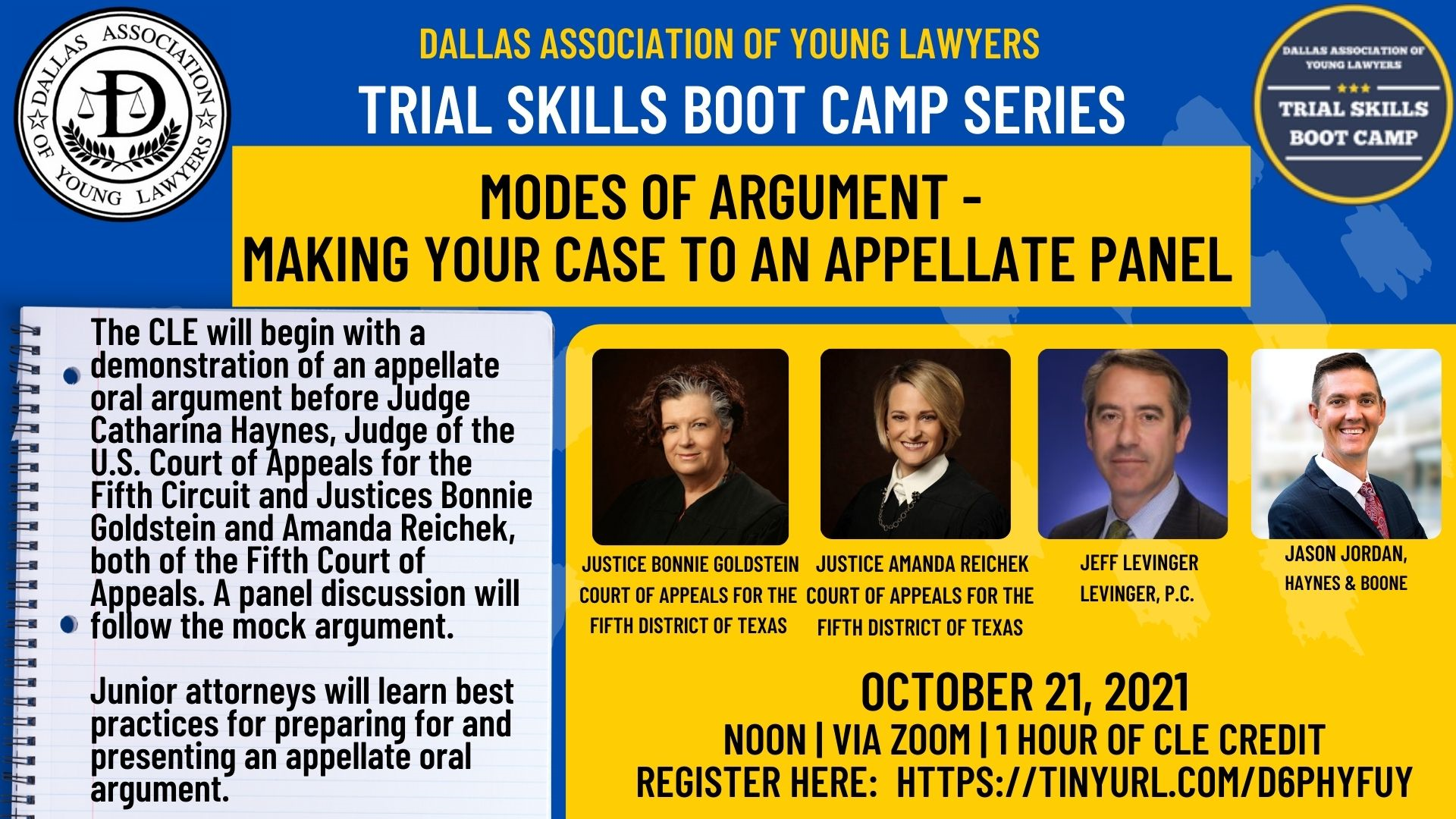I recently wrote an article, “Federalism and Appellate Procedure: Five Texas-Federal Differences to Know,” in the Appellate Advocate, the quarterly publication by the Appellate Section of the State Bar of Texas. I hope you find it interesting and useful.
Monthly Archives: October 2021
 A frequent international traveler alleged that he had been placed on a TSA list that required additional, invasive searches of him when he flew. The Fifth Circuit affirmed the dismissal of the several Constitutional claims that he raised in a lawsuit against the leaders of the relevant federal agencies:
A frequent international traveler alleged that he had been placed on a TSA list that required additional, invasive searches of him when he flew. The Fifth Circuit affirmed the dismissal of the several Constitutional claims that he raised in a lawsuit against the leaders of the relevant federal agencies:
“In short, Ghedi has no right to hassle-free travel. In the Supreme Court’s view, international travel is a ‘freedom’ subject to ‘reasonable governmental regulation.’ And when it comes to reasonable governmental regulation, our sister circuits have held that Government-caused inconveniences during international travel do not deprive a traveler’s right to travel. In the Sixth Circuit’s view, ‘incidental or negligible’ delays of ‘ten minutes’ to ‘an entire day’ do not ‘implicate the right to travel.’ The Second and Tenth Circuits have held the same. Ghedi has therefore failed to plausibly allege that he has been deprived of his right to travel internationally by the extra security measures he has experienced.”
Ghedi v. Mayorkas, No. 20-10995 (Oct. 25, 2021) (footnotes omitted).
A New Orleans bar was sued after two patrons were stabbed by another, underaged patron who had been drinking at the bar. The insurance company denied coverage under a “weapons” exclusion (reaching “instruments of an offensive or defensive nature and include but are not limited to batons, bow or crossbow [?!], arrows, knives, mace, stun guns, tasers, or swords.” The Fifth Circuit affirmed judgment for the insurer:
“The district court described the claims of negligence in state court as Funky 544’s failure to require patron identifications and, more generally, its failure to prevent underage drinking. Even so, an element of each of [the plaintiffs’] claims is that Funky 544’s negligence caused them to be injured by a knife. … The term in this exclusion of ‘arising out of’ the use of weapons unambiguously provides that for coverage, an injury must be entirely separate from those relating to the use of weapons.”
Funky 544, LLC v. Houston Specialty Ins. Co., No. 21-30310 (Oct. 22, 2021) (unpublished).
While specifically addressing a novel Hague Convention child-custody issue, Harm v. Lake-Harm provides a useful general illustration of clear-error review: “There is evidence that SLH might have established a habitual residence in Ireland. As noted above, the family discussed and took steps toward setting up a ‘home base’ in Ireland to provide more opportunities to SLH. … It is equally plausible, however, as the trial court concluded, that SLH’s presence in Ireland was transitory. Ms. Lake-Harm’s career as a
professional musician sent mother and daughter on a dogged schedule of
travel outside Ireland. … We hold that the district court’s determinations are plausible in light of the record as a whole.” No. 20-30488 (Oct. 21, 2021).
In a challenge to the constitutionality of the “eviction moratorium,” the federal government argued that the case had become moot because the specific order at issue had expired. The Fifth Circuit expressed skepticism:
“Appellees respond that the appeal is not moot because the parties still dispute whether the government has constitutional power under the Commerce Clause to invade individual property rights by limiting landlords’ use of state court eviction remedies. The government maintains it has such authority. And in the government’s view, espoused at oral argument, that constitutional power is in no way limited to combatting the ongoing pandemic; the government asserts it can wield that staggering constitutional authority for any reason. Appellees further contend the proposed dismissal is a pretext to avoid appellate review of the constitutional question.”
(emphasis added). The court concluded, however, that it did not need to address mootness because it was granting the government’s motion to dismiss “on terms . . . fixed by the court” under FRAP 42. Those terms included the “express condition” that ‘”our dismissal does not abrogate the district court’s judgment or opinion, both of which remain in full force according to the express concession of the government during oral argument and in briefing.” Terkel v. Centers for Disease Control, No. 21-40137 (Oct. 19, 2021) (One panelist joined the result only.)
 The complexity of the route map for the Erie Railway is well-illustrated by Butler v. Denka Performance Elastomer, LLC, No. 20-30365 (Oct. 15, 2021), in which one judge dissented from the panel’s decision to apply Louisiana tort law without certifying the issue to the Louisiana Supreme Court, and another dissented about the panel’s decision, based on Louisiana law, about whether prescription (limitations) had been established. No. 20-30365 (Oct. 15, 2021).
The complexity of the route map for the Erie Railway is well-illustrated by Butler v. Denka Performance Elastomer, LLC, No. 20-30365 (Oct. 15, 2021), in which one judge dissented from the panel’s decision to apply Louisiana tort law without certifying the issue to the Louisiana Supreme Court, and another dissented about the panel’s decision, based on Louisiana law, about whether prescription (limitations) had been established. No. 20-30365 (Oct. 15, 2021).
The Fifth Circuit denied the stay application in the appeal of the DOJ’s lawsuit against SB8, stating: While the referenced Fifth Circuit opinion primarily focused on Ex Parte Young (not relevant in a suit by the US, see West Virginia v. United States, 479 U.S. 305 (1987)), it made other observations about justiciability that this order suggests will now be central in the resolution of the merits. Professor Steve Vladeck further analyzes the relationship of the two cases in a recent Twitter thread.
While the referenced Fifth Circuit opinion primarily focused on Ex Parte Young (not relevant in a suit by the US, see West Virginia v. United States, 479 U.S. 305 (1987)), it made other observations about justiciability that this order suggests will now be central in the resolution of the merits. Professor Steve Vladeck further analyzes the relationship of the two cases in a recent Twitter thread.
 The annual Appellate Judges Education Institute, hosted by the Appellate Judges Conference, an arm of the American Bar Association’s Judicial Division, will be held November 11-14, 2021, at the Hyatt Regency in Austin, Texas. This Appellate Summit offers four days of advanced-level appellate educational programming and is the largest nationwide gathering of appellate jurists and advocates. The most recent Summit sold out and the ABA had to cut off registrations early. Early-bird registration for the 2021 Summit is now open through October 15, 2021. Over 100 judges from throughout the country have already signed up for the Summit.
The annual Appellate Judges Education Institute, hosted by the Appellate Judges Conference, an arm of the American Bar Association’s Judicial Division, will be held November 11-14, 2021, at the Hyatt Regency in Austin, Texas. This Appellate Summit offers four days of advanced-level appellate educational programming and is the largest nationwide gathering of appellate jurists and advocates. The most recent Summit sold out and the ABA had to cut off registrations early. Early-bird registration for the 2021 Summit is now open through October 15, 2021. Over 100 judges from throughout the country have already signed up for the Summit.
This year’s summit features speakers on the following topics, among others:
- How Judges Read in an E-filing Era
- Top-Notch Oral Argument Answers
- Managing Stress and Strengthening Resiliency: Practical Strategies for Judges and Lawyers
- Building and Growing an Appellate Practice
- Supreme Court Preview
- Writing from the Reader’s Perspective: How the English Language Really Works
- United States Supreme Court Civil Update
- Storytelling for Advocates and Judges: How and Why We Should Incorporate Storytelling Techniques and Themes into our Work
Panelists include:
Erwin Chemerinsky, Dean of the University of California, Berkeley, School of Law
Hon. Nathan Hecht, Chief Justice, Texas Supreme Court
Hon. Bridget Mary McCormack, Chief Justice, Michigan Supreme Court
Hon. Albert Diaz, United States Court of Appeals for the Fourth Circuit
Hon. James Earl Graves Jr., United States Court of Appeals for the Fifth Circuit
Hon. Consuelo Callahan, United States Court of Appeals for the Ninth Circuit
Hon. Steven H. David, Indiana Supreme Court
Hon. Marsha Ternus, former Chief Justice, Iowa Supreme Court
Hon. Samuel A. Thumma, Arizona Court of Appeals
Hon. Martha Warner, Fourth District Court of Appeal, Florida
Hon. David W. Ellis, Illinois Court of Appeals and best-selling author
Kannon K. Shanmugam, Partner, Paul, Weiss, Rifkind, Wharton & Garrison LLP
George Gopen, Ph.D., Professor Emeritus of the Practice of Rhetoric, Duke University & Consultant on Writing the English Language
The summit will be taking place in a hotel that will easily accommodate social distancing for attendees and presenter. The ballroom boasts over 14,000 square feet and a ceiling height of 22 feet. It is rated to hold more than 1,000 attendees during normal times, but will be capped at 400 attendees. Round tables will be set with no more than 4-5 seats instead of the usual 7 to 8. The opening reception at the Bullock Museum will be held in the museum’s Grand Lobby, which has a capacity of 600. Additionally, a color coding system, to reflect your social distancing preference, will be offered at registration. Meals also will have enhanced safety measures.
For further details on speakers, programs, and registration, go to: https://lnkd.in/exxjtGjA.
In the movie “Girls! Girls! Girls!” Elvis  Presley enthusiastically sang “Return to Sender.” In that general spirit, the Fifth Circuit affirmed a disgorgement award in SEC v. Blackburn when “[f]irst, the disgorgement amounts are the profits defendants received from their securities fraud,” and “[s]econd, the district court concluded that the SEC has identified the victims and created a process for the return of disgorged funds” to the victims. (emphasis added). In so doing, the SEC avoided the “the issue [Liu v. SEC, 140 S. Ct. 1936 (2020)] left open: whether
Presley enthusiastically sang “Return to Sender.” In that general spirit, the Fifth Circuit affirmed a disgorgement award in SEC v. Blackburn when “[f]irst, the disgorgement amounts are the profits defendants received from their securities fraud,” and “[s]econd, the district court concluded that the SEC has identified the victims and created a process for the return of disgorged funds” to the victims. (emphasis added). In so doing, the SEC avoided the “the issue [Liu v. SEC, 140 S. Ct. 1936 (2020)] left open: whether
disgorgement is ‘awarded for victims’ when the money is put into a
Treasury fund that helps “pay whistleblowers reporting securities fraud and
to fund the activities of the Inspector General.” No. 20-30464 (Oct. 12, 2021).
The fantastically controversial Texas abortion statute returned to the Fifth Circuit, which granted an administrative stay on Friday, October 8, while it receives further briefing about a stay during the appeal of Judge Pittman’s preliminary-injunction order. Enthusiasts of court history will note that the motions panel —
 bears substantial similarity to the original panel in what led to the 2021 Supreme Court opinion in Collins v. Yellen. The panel divided 2-1 (Judges Haynes and Stewart, joining) about the constitutional problem with Fannie Mae’s regulator, and then again divided 2-1 (Judges Haynes and Willett, joining) about the proper remedy:
bears substantial similarity to the original panel in what led to the 2021 Supreme Court opinion in Collins v. Yellen. The panel divided 2-1 (Judges Haynes and Stewart, joining) about the constitutional problem with Fannie Mae’s regulator, and then again divided 2-1 (Judges Haynes and Willett, joining) about the proper remedy:
 Johnson alleged that BOKF’s collection of “extended overdraft charges” (fees charged to customers who overdraw on their checking accounts and fail to timely pay the bank for covering the overdraft) were “interest” within the meaning of the National Bank Act. The Fifth Circuit rejected her claim, giving Auer deference to an interpretive letter of the Office of the Comptroller of the Currency, and noting as to the relevant considerations:
Johnson alleged that BOKF’s collection of “extended overdraft charges” (fees charged to customers who overdraw on their checking accounts and fail to timely pay the bank for covering the overdraft) were “interest” within the meaning of the National Bank Act. The Fifth Circuit rejected her claim, giving Auer deference to an interpretive letter of the Office of the Comptroller of the Currency, and noting as to the relevant considerations:
- Authoritative. The letter was drafted by the OCC’s chief counsel, in response to a bank’s request for OCC guidance, and thus “bears the hallmarks of an official interpretation by OCC.”
- Within the agency’s substantive expertise. OCC administers the National Bank Act, the letter “appears aimed at providing assurance to regulated parties,” and did not appear to merely take a “convenient litigating position.”
- Fair and considered judgment. The letter “is neither plainly erroneous nor inconsistent with the regulations it interprets.”
No. 18-11375 (Sept. 29, 2021).

